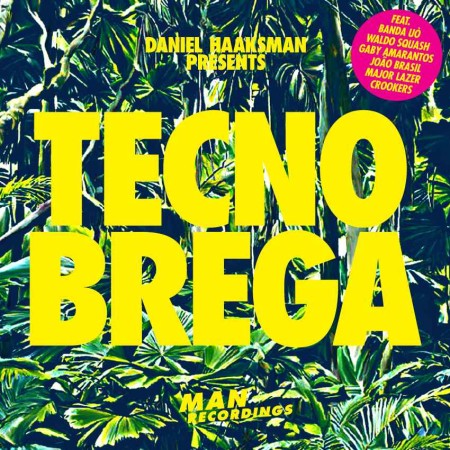We are unquestionably late on this one (it was released in late 2012 after all, around the time when we interviewed label owner Daniel Haaksman), but it's an album that fully deserves to get reviewed, if only because little that has come through the Afropop office in the past 6 months has come close to being as endlessly listenable as this collection of eccentrically street-smart pop gems. And given that brega's rise to international attention has been the story of overcoming the perceived (and real!) limitations of the genre, the unassailable variety and clear intelligence displayed by the music on this compilation feels like a definite arrival.
For those who haven't necessarily heard tecno brega (roughly translated from Portuguese as "cheesy techno") it may be, well... something of an aquired taste. Underpinned by the endless permutations of basic beat structure, Brega builds a universe of shameless sugar, one constructed out of the synthiest of synths (don't believe me? listen to album opener "Brega do Iphone" with its NES-style quasi-medieval burbles, or "Pith Bulls" piercing tones), drum machines pulled from eighties worst nightmares, and melodies that never heard an ABBA song they didn't like. It really should be terrible- and for a while, a fair bit of it probably was. But, over the past few years, a generation of producers like Waldo Squash, DJ Cremoso or Joao Brasil (all of whom are featured heavily on the album) have begun to push Brega's sound forward into an increasingly inventive future. These artists- plus any number of others emerging from Brazil's febrile electronic community- have used Brega's pop overload as a license for real invention and near total freedom.
This remarkably consistent album bears the fruit of these efforts. While the underlying rhythmic and melodic structures that define the brega sound are never fully abandoned, they are stretched to the breaking point again and again, incorporating influences like the full-body rumble of dubstep and the tension-release patterns of euro-american electro-pop (not to mention the somewhat closer inspiration of Rio's Funk Carioca), fusing them into an increasingly broad compositional palette. The results, witnessed on tracks like Banda Uo's standoud "Faz Uo" are simply transcendent.
Interlocking male and female vocals chant hooks over a beat that bucks and shimmies, pulling up short over a stretched tone for a tension raising half-second before dropping back into groove. It's the kind of move that's ubiquitous in electronic music the world over, but instead of the expected dub-step half-time or 4 on the floor explosion, the song pulls back into the mid-tempo brega beat, the arpeggios kick in, and before you know it, we are firmly back in Belem. This kind of structural and referential invention is by no means confined to one or two tracks. Other highlights include the utterly hilarious faux-thrash (mighty morphing power rangers theme song style) of "Metal Brega," the shout-rapped delivery of "Pithbull" by Gang do Electro, and the spaghetti western guitar of "Fim De Festa"
Perhaps because of the obvious copywrite issues that it can present, the album displays less evidence of the prodigious talents many of these artists possess as remixers (DJ Cremoso in particular is excellent, and readers should definitely check out his remix of the Strokes, a favor that the band may have potentially repaid on their latest album) and/or audio-pirates (Banda Uo's total reconstruction of Willow Smith's "Whip My Hair" in "Shake De Amor" is a masterclass in this approach). In the place these kinds of outright repossessions, the album gives us cuts like Edu K's brilliant re-imagining of Pink Floyd's "Money" as a stuttering, dayglow clad dancefloor killer, unleashing synthetic lightning storms around the familiar melody, which is is itself stretched and squeezed to fit the confines of the shifting rhythms. The fact that Edu K does all of this while also managing to fit in references to both Cumbia and the Sleng Teng riddim gives you an idea of the cultural polyphony that drives this music.
Taken as a whole, the album is a fascinating, smart and frequently hilarious ride- this music is fun, and the musicians are clearly having fun making it. For any Brega doubters out there, it stands as a clear evidence of the genre's rapidly developing maturing, and holds out a serious promise for it's future. And for fans? It's the perfect way to introduce people to their new favorite genre.









